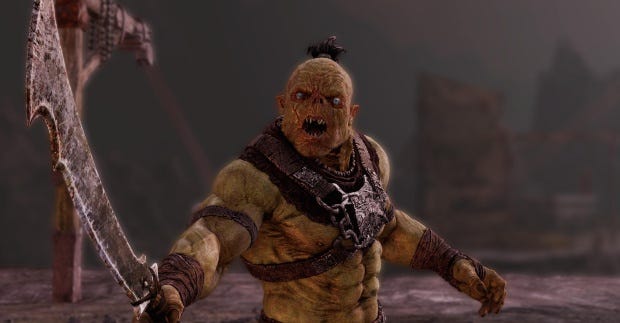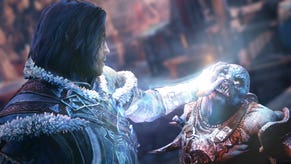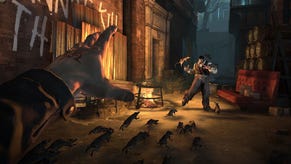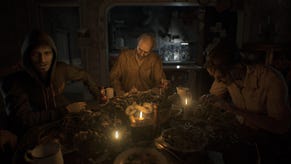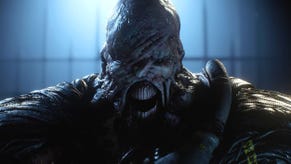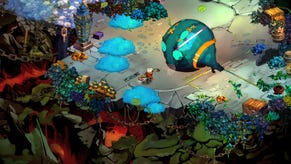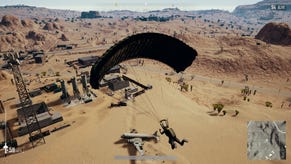Wot I Think (So Far): Middle-Earth: Shadow Of Mordor
Sauron's Creed
I haven't finished Middle-Earth: Shadow Of Mordor, because for whatever tiresome reasons Warner refused to give us (and seemingly us alone) code before the game’s release. This is after a couple of lengthy days spent plugging away at what is a huge, detailed, and really rather fantastic brawling action game, set betwixt Hobbit and Lord Of The Rings (and importantly, it’s fun even if you don’t care about either). Here's wot I think (so far).
Shadow Of Mordor is a game that really does go out of its way not to be liked at first. It’s really quite extraordinary, how deliberately it seems to have been designed to put people off, overwhelm them with vast numbers of controls, abilities and fighting techniques, and poorly or barely explain them all. And alongside that, to have everything so incredibly difficult that you’ll die and die and die, and not know what you’re doing wrong. But bear with it. It’s worth it.
Dying again and again isn’t so much of a problem for player character Talion, a ranger who suffered the horror of watching his wife and son slaughtered in front of him, before being killed himself. Killed by the rising forces of Sauron, no less. However, on dying, Talion is infested by a wraith of ambiguous morality – a wrinkly old elf-looking chap, who can’t remember his own name. He imbues Talion with lots of super-cool wraith powers, and the two of them set off for some pretty gruesome revenge.
So we have our setting for some third-person biff-boff action – the realms of Mordor, the rising armies of orcs, most especially their toughest species, Uruks. Then some quite extraordinarily liberal borrowing from Assassin’s Creed sets things up for an open-world, multiple quest-chained series of stealth and action antics.
And then there’s the Captains. During the game’s development, it was hard not to see this as the sort of gimmick that gets talked up a lot in interviews, and then fades into the background in the finished product – each enemy having a unique name, unique traits, and if they do well, gaining ranks and notoriety until you polish them off. But cor, it’s a big part of things, and it really works. If an uruk kills you, he’ll get promoted to captain, and either take the place of a current captain or die trying. Kill you multiple times and he’ll climb the ranks, trying to get to the ultimate spot of Warlord. Captains can also improve their positions through politics of their own, which exist in the game in the form of side-quests – ignore them and they’ll succeed in their aims and get stronger, go interfere and you can scupper things. Each have strengths and weaknesses that can be learned by interrogating (catching and mind-sucking) other captains or marked uruks (“worms”), which will inform you that, say, Gorgum Foul-Spawn is vulnerable to steal and combat finishers, but invulnerable to ranged attacks, and that he’s scared of caragors (big monster beasties). You can then approach killing him a lot more tactically.
What works especially well about this is developing a sense that things are getting personal. During my first few hours with the game, I was killed by this one utter bastard - Pash The Elder - about fifteen times – he’d spring up from anywhere, interfering in almost every fight I had, causing me to scream and swear and wave my arms around in abject fury. When I finally killed him, oh sweet Galadriel, what a moment that was. That meant so much to me. I danced my character on his fallen corpse.
But that dying I mentioned. Monolith have screwed up the delivery of information on such a dramatic scale that it defies belief that it could have been unintentional. But intending to do it is so batshit that I cannot think of a rationale for why. It’s damned weird. There is so much going on in this game, from hunting down Ithildin (weird glowing symbols), to earning Mirian (the game’s currency), to the whole Captain system, to the myriad button combinations for fighting, stealthing, taming beasts, combos, special moves, blocking, dodging, leaping, and then weapons, runes for weapons, earning rune space for weapons, unlocking abilities, the three different ways you unlock abilities, Focus and its uses, restoring focus, Elf-shot magical arrows, restoring arrows, interrogating, draining power, stealth draining… All of it fits in nicely, works smoothly, and once understood doesn’t overwhelm. But when a game says, “Hey, this is an open world, go explore!” and so you do that, it really needs to be able to accommodate it.
As it is, the reality here is you really have to start the main quests straight away to have any of the basics introduced to you. Skills and tricks that are vital are only taught through these, despite the appearance that you should be able to chase down the dozens and dozens of side-quests and collectables that litter the lands. And more confusing, everything you try to do at first will see you massively overwhelmed by enemies. Fight anyone, and you can suddenly find yourself surrounded by fifteen or twenty powerful enemies, with a combat system that can cope with three at once at the most. Die, because you will, and then those enemies get stronger! It self-perpetuates, and makes you feel useless, only making the world harder for you to live in. I’m hearing from many friends that they’ve been put off the game by their first hour with it, and I came close too.
So let me offer you the realisations first, so you don’t have to go through that. First, do the first six main quests (two branches are there at the start, then it splits into three, so pick from each). Vital tutorial information, and indeed vital skills, are only available this way. And second, stealth. It looks like an all-action game, the tutorial sequence at the start presents it like all-action game, but it isn’t an all-action game. You’re going to need to hide, sneak, and pick enemies out using cunning tactics, rather than wade in and start swinging swords. It communicates the opposite, which is ridiculous. But embrace the sneak, and suddenly it makes so much more sense. And thirdly, run away. So many games have taught us not to do this, but here it’s often the right move. Turn, sprint, hide. Orcs are massive thickos, and even climbing onto a nearby roof and removing line of sight has their AI give up looking for you. (It’s best to just say, “orcs are stupid”, and not spoil it for yourself by saying, “The AI is useless”.)
Once you’ve got a whole pile of moves, and you can “teleport” in and out of battle, ride around on the backs of beasties, or bring enemies onto your side, it becomes a far more satisfying experience. Learning a captain’s weakness and exploiting it is enormously satisfying, especially if it involves dropping a nest of flies on him to freak him out, then filling his face with magic arrows, before dropping in on his head from above to stuck a dagger through his brain. Especially if he’s a fucker who’s killed your five times previously. (Dying just has you reappear at the nearest unlocked Forge Tower, as well as levelling up involved baddies.)
The main quests are also well worth pursuing. There’s some lovely story writing in there, and as someone who has never found any love for Tolkein’s world, I have still enjoyed the fan service content here linking The Hobbit to LOTR, and some nice juicy gobbets about those pesky rings. Gollum has a main quest line, and it’s extremely well done (so far, at least), his character pleasingly unpleasant and untrustworthy, and his appearance thoughtful, rather than crowbarred in for recognition. And the banter between Talion and his wraith inhabitant is nicely crafted, with much confusion about whether to trust him or not. Oh, and Ratbag, an orc you'll be reluctantly working with, is properly funny. It's lovely to remember that Monolith - even if it's just the paint on the studio walls that remains from those olden days - can still write genuinely funny comedy lines.
Plus, just like Assassin’s Creed, it’s fun to be a super-nimble killing machine. Darting up the sides of buildings, perching on beams, leaping from wall to wall, is all mostly smooth and satisfying. The bow and arrow is a meaty, satisfying weapon alongside the sword and dagger.
While it becomes a huge amount of fun, there are some frustrations. The mouse/keyboard options are not really sensible. Where the controller can manage quite so many interaction options via long presses and taps, along with multiple buttons being pressed at once, obviously the keyboard cannot, so you’re left with a plainly ridiculous number of keys to try to remember and manage. Perhaps this is why Warner was so keen to hide the PC version? It’s a terrible implementation. However, being a dedicated PC gamer and not owning a controller, at this point, is a little contradictory. Played with my 360 controller, it’s all ideal.
However, it’s glitchy, too. Far too many times I’ve suffered in fights because Talion wouldn’t walk past a stone, or decided he was best friends with a wall. It’s not incessant, at all, but frequent enough to be noticeable, and frustrating. And too many times have I found myself climbing a wall, instead of jumping over an enemy, due to the conflation of the controls.
Also, there's a really disappointing factor: fallen captains seem to come back to life. I'm not sure whether it's a bug, or whether their boasts of a kerbillion unique enemies were a touch hollow, but it's bitterly disappointing to see a captain you'd particularly enjoyed finishing suddenly strolling up again. Sure, you come back to life each time, but it does rather shatter the point if they do. Hopefully this is something that'll be patched out soon.
Edit: It seems that captains only die when their heads are cut off, which is a bit of a disappointing discovery. (And yet another very poorly communicated feature.) However, it seems to lead to good things, checkout the top highlighted comment.
I have no doubt that Monolith has screwed up the welcome to Shadow Of Mordor. Failing to explain important basics, and perhaps even worse, giving an unhelpful impression of how to play through its opening scenes, means that too many will get (and are getting, according to many forums and anecdotal examples coming my way) daunted by constant death in the face of woefully unfair odds. But get past that, learn how it really needs to be approached, and then it becomes a superbly fun ride. It’s involved, it’s well-constructed, and it’s going to make people cross at Ubisoft. There are so many lovely details, wonderful moments as captains start taking things personally, and that pleasurable zone of proficiently clearing out camps and even capably taking on multiple captains at once.
I shall come back and write more when I’ve finished the game, but based on a hefty chunk of hours with it, this is top stuff. Definitely recommended.
